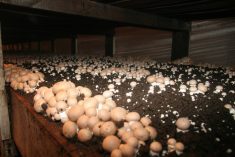Glacier FarmMedia – The Canadian Meat Council says incoming changes to the Temporary Foreign Workers Program are going to add to the sector’s already significant labour challenges.
In a media release the group, which represents federally licensed meat packers and meat processors and suppliers of goods and services to the meat industry, said the move will challenge “…the ability for meat processors to fulfill the needs of Canadian consumers.”
In 2022 the federal government loosened the rules of its Temporary Foreign Worker Program Workforce Solutions Road Map in response to what it saw as a critical labour shortage in several industries, including food processing.
Read Also

U.S. cattle producers fear return of screwworm
Parasitic screwworm flies are pushing northward from Central America again after being officially eradicated from the United States in 1966, threatening $1.8 billion in damage to Texas’ economy alone.
Under those rules employers in the designated sectors were allowed to hire up to 30 per cent of their workforce through the TFW program for low-wage positions. All other employers saw their limit increased to 20 per cent, up from a ten per cent cap.
Those temporary measures are now being rolled back, a move the CMC says is “hasty” and “premature.”
“Through the decision to unilaterally end the temporary measures, this announcement has undermined the certainty we have been working with the government to create “with no notice or consultation,” the group wrote in its release.
According to figures from Statistics Canada’s 2022 Job Vacancy and Wage Survey, the food manufacturing sector had a 5.8 per cent vacancy rate, compared to a 5.4 per cent vacancy rate across all sectors. Meat product manufacturing had a 6.7 per cent vacancy rate.
That same report noted that in 2022, just over 70,000 TFWs worked in primary agriculture industries in Canada, and just over 36,000 TFWs worked in food and beverage manufacturing industries.
The CMC says reducing the number of TFWs working in the sector will impact processors, who had initially been promised the measures would run through to August of 2024.
“The removal of these measures without meaningful industry consultation will have significant consequences for processors who put food on grocery store shelves,” their release stated.
Chris White, the meat council’s CEO, linked the move to food affordability, saying it would increase food costs for Canadians.
“This is yet another unhelpful policy measure at odds with providing an end-product to consumers at a price-point they can afford,” White said in the release.
“We unequivocally refute the notion that employers are unduly reliant on temporary foreign workers.”
















